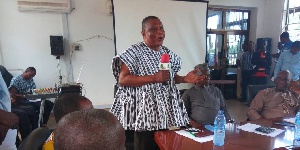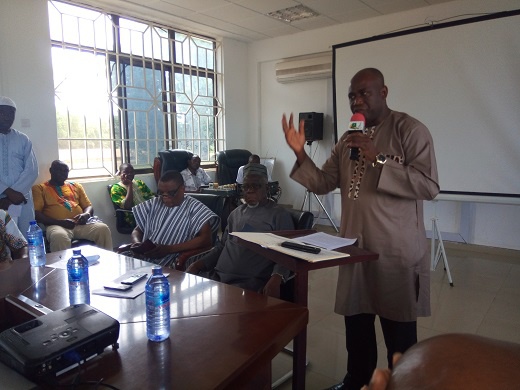 Minister of State responsible for Food and Agriculture, Dr. Gyiele Kwaku Nurah
Minister of State responsible for Food and Agriculture, Dr. Gyiele Kwaku Nurah
The District Chamber of Agriculture, Commerce and Technology (DCACT) has warned the joy of Ghanaians who want to see the factory promised every district by government delivered could turn sour if Metropolitan, Municipal and District Chief Executives (MMDCEs) snub unfamiliar telephone calls and emails in the coming days.
The chamber says it has so far received over 300 proposals from investors who are only a call or an email away from arriving in the districts to launch the factories highly manifestoed in the campaign run-up to the 2016 polls by the now-ruling New Patriotic Party (NPP).
“One District One Factory has received over 300 proposals. They need to direct the investors into which districts they have to go. The District Chamber of Agriculture, Commerce and Technology will position the districts to bring out the investment potentials and profiles of every district and these will be sent to various institutions that receive and attract investments for their countries to be able to direct all these investments into the various places,” Ebow Graham, a consultant to the DCACT, said in a meeting held in Bolgatanga, the Upper East regional capital, to sensitise stakeholders on the establishment of DCACT for government’s "Planting for Jobs and Investments" policy.
He told the region’s Municipal and District Chief Executives, who formed the core of the stakeholders present, that: “One of the things that would block any initiative is when the MMDCEs are not admitting calls. So, DCEs, please, a lot of phone calls will come to you; pick your calls. They might be the investors coming to your table. And make your emails working. The project proposals should be in line with the medium-term development plans of the MMDAs (Metropolitan, Municipal and District Assemblies) in consultation with the Department of [Agriculture].”

A consultant to the DCACT, Ebow Graham
Our seedlings will not be like the SADA seedlings- Minister of State
It was also announced in the meeting that the “Planting for Jobs and Investments” policy would not be limited to the cultivation of food crops.
The Minister of State responsible for Food and Agriculture, Dr. Gyiele Kwaku Nurah, told the gathering six cash crops including cashew, shea, mango, rubber and oil palm, citrus and cocoa had been identified and incorporated into the new concept “Planting for Jobs and Investments”. He lamented the inability of Ghana’s north to nurture its abundant shea as the south had developed its cocoa into an exportable scale, describing the backward state of the northern economy as self-inflicted and unfortunate.
“What is beautiful about what we are discussing here today is the integration of tree crops in our agricultural system. It’s been very unfortunate we have not been able to develop the tree crop sector of the north. People in the south have continued to maximise their returns on oil palm, on rubber, on cocoa and others. What have we done to ourselves in the north? Which tree can we say we depend on? Even if we take cotton as a cash crop, where are we in cotton? It’s not sustainable. We haven’t developed it to the level that we can say it’s our cocoa,” he commented.
Whilst blaming the north's hungry tree economy on widespread disinterest and uninterrupted bushfires, he pointed at Ghana's next-door neighbour, Burkina Faso, as a close good example the northern sector should imitate to mitigate its hardships.
“The cashew comes, the few trees you travel and see, the following year you travel you can’t see them. Where are they? Swallowed by bushfires. Mango, which is becoming fast the cocoa of Burkina [Faso], tell why mango cannot become the cocoa of the northern sector. And that is what this project is trying to address. The integration of tree crops into our agricultural system is going to benefit us greatly because you would realise that here when the rain fall is bad and the grains do not do well, the tree crops look very healthy. When there is bad weather, the tree crop will do well. In the good weather, they don’t do so well; but the grains do so well. So, as a measure to stabilise our own economy in the north, we need to integrate the two. The northern farmer will not be poor again,” assured Dr. Nurah.
He, however, affirmed that the tree investment project, which the new government was resolved to launch, would not end up impossible to trace as did the seedlings planted by the former government under the Savannah Accelerated Development Authority (SADA).
“We must plant commercial trees and that will represent our cocoa in the north. And I will plead with everyone, not only the DCEs, but we those who are managing the economy of the north that when this project takes off we should put all our hearts to it and make sure that all the seedlings that are supplied do not become the SADA seedlings or the SADA guinea fowls,” Dr. Nurah urged, attracting applause from a section of the audience.

Deputy Minister for Local Government and Rural Development
20,000 farmers for engagement; 200 youths for recruitment
The Deputy Minister for Local Government and Rural Development, Augustine Collins Ntim, disclosed farmers numbering between 10, 000 and 20, 000 would be supported to grow economic trees under the “Planting for Jobs and Investments” concept.
“Under the concept, Metropolitan, Municipal and District Assemblies (MMDAs) would be required to come out with an agricultural project initiative taking into consideration one or two of the identified cash crops in our manifesto with a budget that would support 10, 000 to 20,000 farmers to cultivate an average of 10 acres of the crops within the next four years.
“They would be required to establish seed banks in the electoral areas that would raise improved and high-yielding varieties of seedlings as approved for the district to be allocated to the farmers. Metropolitan, Municipal and District Assemblies would also be required to recruit between 100 to 200 youth in every district who would be trained to support the farmers to plant the seedling,” the Deputy Minister said.
The Upper East Regional Minister, Rockson Ayine Bukari, remarked that the region had continued to get less than what was expected from the labour of its “poor farmers” owing to a number of factors.
“There have been rhetorics of modernising agriculture and yet production and productivity are nothing to write home about and we still import food supplements and the greater part of our agricultural exports continue to be in raw and unprocessed form. At best we have semi-processed goods. We are, therefore, not yielding the required benefits from the toil of our poor farmers.
“This can be attributed to several challenges related to inadequate access to funding or aid for farmers and fishermen, lack of machinery, technological expertise, storage facilities, transportation and ready market for the produce among others. Indeed, as a government that took over the reins of government with a promise to create jobs, we think we must pay attention to areas of great potential and hence the various interventions in agriculture,” the Regional Minister observed.